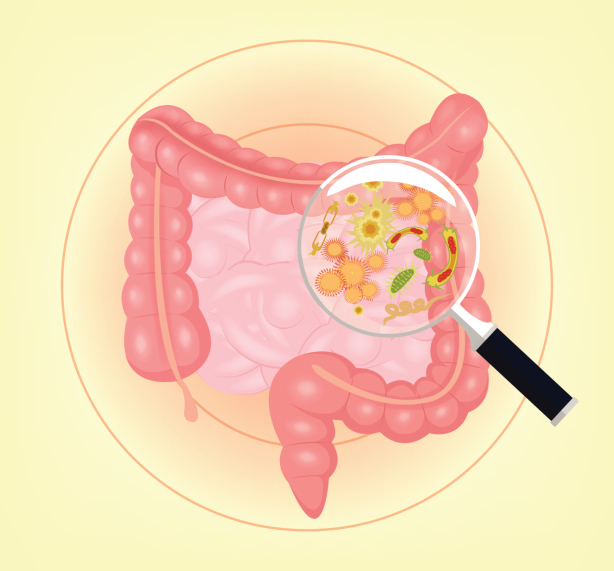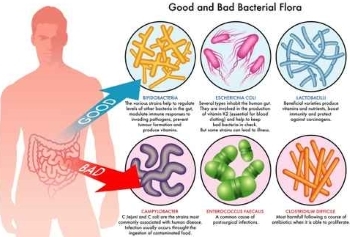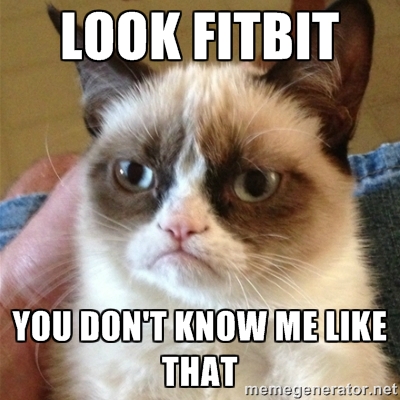A borderline taboo subject, but comical nonetheless! Enjoy some knowledge with your morning cup of joe!
^^ Dundore and Heister, on Penn Ave in Wyomissing, has some great treats for your gut bacteria!

Click image to link to Human Microbiome Project
More and more research is shining light on how important our microbiome is to our overall health. Here’s another, investigating how gut bacteria may affect the ageing process. (link to full article)
“As part of their study, scientists working with Dario Riccardo Valenzano at the Max Planck Institute in Cologne treated a number of 9.5-week-old killifish with antibiotics to clear out their intestinal flora. They then exposed these middle-aged animals to the intestinal contents of younger, 6-week-old killifish in an aquarium. When the animals ‘taste’ the particles swimming around them, they also inevitably absorb the gut bacteria in the faecal remains swimming in the water. In this way, the bacteria from the young fish are successfully ‘transplanted’ into the older organism and colonize its gut. The older fish that receive the young intestinal microbiota not only live considerably longer than fish that were exposed only to their own gut microbiota or to those of animals of the same age, these ‘geriatric’ killifish, aged 16 weeks, are also as agile as young fish.”
Now, I’m not saying to go eating anything unsavory, but this is some interesting research! What will the future bring?
Here’s an interesting article on why your calories may be inaccurate or misleading if you’re using My Fitness Pal, which I know many of you are! Hint: it really doesn’t matter. If you’re hitting your macro goals you’re doing just fine.
Click this link to read up on why your jeans really fit better when you’re eating low carb, and gain a few takeaways on whether it means you’re truly doing what’s best for your body. Paul Nobles provides a well-rounded, knowledgeable perspective on the low-carb idea.
“Assuming you are working out and you take a balanced approach to fitness, you are doing some combination of calorie burn and muscle breakdown. The goal is to eat enough (and potentially even more) to build leaner, stronger tissue.”
-P. Nobles
If life is anything, it’s a constantly varying experiment. Try something new and see what works for you.
Happy weekend, CFers!
A little food for thought this weekend. Carry on!

“Calories by themselves aren’t all that useful. I mean sure, you need them to function but what I mean is they aren’t necessarily going to add up to “less calories equals magazine cover ab shot”. In fact almost the exact opposite is what allows for muscle to be built. Unless you are new to resistance training (either weight lifting or body weight movements) it’s going to take a real smart approach to maintain and build muscle. It’s really this constant focus on fat that is keeping people stalled.”
“An Argument for Sanity
If there is one thing that I’m learning with Eat To Perform is that there are two camps that really stand out. “The Clean Eaters” and the folks that enjoy most of the foods above, sometimes responsibly and sometimes not. The simple fact of the matter is this, both could benefit from knowing the approach of the other and why it does or does not work. It’s this polarizing point of view on food that leaves people feeling judged and frankly doesn’t lead to whole lot of enlightenment.
If you are a health professional (trainer, dietitian or even a doctor) if you aren’t teaching your folks some level of flexibility, are you really helping them? Let me put that differently: if you tell someone their life will be better if they do the Tour De France every 4 months, that’s not all that sustainable is it? The reason I am using the Tour De France as an example is because it represents the type of extreme you are prescribing and it’s leaving everyone obese.
Do you honestly think these folks have never dieted or tried reducing their intake of processed foods? Admit it, you haven’t spent a whole lot of time doing the research and what you are offering as the solution is ACTUALLY the problem for a lot of people. Painting your clients in a corner like that isn’t helping and if you are fit you know that you don’t eat like that and if you do eat like that you’re missing out on a lot of genetic potential.
I am not arguing for processed foods or even alcohol. I am arguing for sanity and understanding. and if the first thing we are starting with is an approach that doesn’t foster building and maintaining muscle then we are really missing the boat. Muscle is the main driver for metabolism and expanding your metabolic rate. Teaching people a way that makes their body more inflexible shouldn’t be the goal. This is why demonizing foods misses the real point and the real point is that you shouldn’t be dieting all of the damn time. That way when you do it will be more effective especially when you do it with a more enlightened approach.”
-Eat to Perform

Not the courageous type this time, but the literal type. Your guts contain loads of information that make you who you are, maybe more so than many other organ systems!
Some signs your digestive microbiome may be out of whack include intestinal issues, mental issues (depression, brain fog), stress, weight issues, and skin conditions. Surprisingly, you can change your own microbiome for the better if you work at it. A few tips include: getting dirty and sweaty, incorporating more fermented foods and good veggies into your diet and reducing sugar and meat / animal products. Check the links to learn more!
A couple more interesting articles here and here. Enjoy!
Is sugar toxic?
Here are a few articles fervently supporting this theory…
Time: Sugar is Definitely Toxic
“After nine days of having their total dietary sugar reduced to 10% of their daily calories, however, they showed improvements in all of these measures. Overall, their fasting blood sugar levels dropped by 53%, along with the amount of insulin their bodies produced since insulin is normally needed to break down carbohydrates and sugars. Their triglyceride and LDL levels also declined and, most importantly, they showed less fat in their liver.”
Sugar Science: The Toxic Truth
“There is growing scientific consensus that one of the most common types of sugar,fructose, can be toxic to the liver, just like alcohol.”
Global Healing Center: Refined Sugar: The Sweetest Poison of All
“Refined sugar is lethal when ingested by humans because it provides only that which nutritionists describe as “empty” or “naked” calories. It lacks the natural minerals which are present in the sugar beet or cane.
In addition, sugar is worse than nothing because it drains and leaches the body of precious vitamins and minerals through the demand its digestion, detoxification and elimination makes upon one’s entire system.”
…an analysis…
NYTimes: Is Sugar Toxic?
“If what happens in laboratory rodents also happens in humans, and if we are eating enough sugar to make it happen, then we are in trouble.”
…and a few other points of view:
Stats.org: Glaring Flaws in Sugar Toxicity Study
“Tom Sanders, professor emeritus of nutrition and dietetics at King’s College London, said the study needed to be viewed “with some skepticism” because it was uncontrolled. It did not compare the children with a similar group who continued to eat a high-sugar diet. The comparison instead was made with their weight and health before the study while on their usual diet. “But it is well known that obese children underestimate and under-report food intake, particularly of soft drinks and snack foods,” said Sanders.
‘This is a fundamental flaw in the study. It is likely that the changes in metabolic outcomes observed can be explained by the experimental diet providing fewer calories than the children’s usual intake.'”
The Atlantic: Being Happy with Sugar
“The metabolic effects of fructose presented in ordinary human diets remain poorly investigated and highly controversial.”
Bottom line, it’s probably not great. Do your research, use your brain, and decide for yourself.
featured image: theatlantic.com

If you’re using a fitbit to track your activity and food intake, here are a couple very informative articles on why it may or may not work out as you planned:
Fitbit: You’re Doing it Wrong, P Nobles
“The problem with eating inflexibly for too long is your body adapts to that. FYI — that’s also the reason you are under-eating your Fitbit burn by 700 calories and still not losing weight. The body searches for balance (homeostasis), so if you feed your body an inadequate amount for your activity level, it simply adjusts. That’s why what we teach is so important. You can only dig a hole for so long before you hit a point of resistance.”
“So, should you be eating the number on your Fitbit? I’m going to say yes, you should. This assumes you understand a bit about how things work, and if you don’t, we have a staff of 35 people who can help. But if you aren’t seeing results with your fat loss goals, it’s probably because you have been burning the candle at both ends for too long.”
PFFL: We’re All Athletes (Doing your Fitbit Right), P Nobles
“The biggest problem with the “calories in/calories out” crowd is that they miss the real magic. There’s no question that calorie counting is a great tool for making people more aware of how much they do and how much they eat. But if you keep banging that same “do more/eat less” hammer, your body will simply adjust (i.e., down-regulate).”
“What does that mean for you, specifically? If you are a 350 pound male with more fat to use, your intervals between PFFL periods might be shorter. If you are a 110 pound female, you might never need to do PFFL. Ultimately, it can be customized for anyone, and this is the point. “One size fits all” dieting is a myth. Everyone needs to get a little specific to see real results. Long story longer — if you are using your Fitbit as a way of creating a deficit, you may see much better long-term results by eating what you burn, because that’s the way your body wants to work.”
Most Americans are getting way too much sugar. It shows up in hidden foods you might not realize: pasta sauce, yogurt, salad dressing, “healthy” breakfast cereal… And sugar is a crazy addictive substance - for a good reason - it provides quick energy and fat storage that our ancient ancestors could use to get away from danger and/or hold on to extra calories in case food became scarce. Why not create an innate drive to find and consume it? The problem with modern society is that sugar is now everywhere and food is hardly every truly scarce. So how do we adapt to modern times?
- Eat real food (per Michael Pollan: not too much, mostly plants)
- Eat like your grandparents would have. No constant access to sweets, treats, snacks.
- Make your own food, own the ingredients and the process
- Maybe even start a garden or at least shop at a local farmers’ market
- Plan your meals - less ingredient waste, more real food, less propensity for snacking when you know what you’re going to have next
Check out these links for more facts, opinions, and information:
Mark’s daily apple - definitive guide to sugar
Yuri Elkaim - Sugar Detox
Evolutionary reason why we love sugar
- 5 Weekly Meetings Once a Week
- 60-90 minutes per meeting
- 4-10 people per group
- Meetings held at BLDG. 7 Yoga | Earth Room
- Weight Loss
- Increased Energy
- Better and more restful sleep
- Boosted immune system
- Mental clarity and improved mood
- Decreased anxiety
- Reduced PMS/Menopause symptoms
YOU’LL LEARN
- Week 1:How to prepare for your REAL FOOD sugar detox
- Week 2:Your digestive check-in
- Week 3:What sugar really does in your body
- Week 4:The truth about FATS
- Week 5:How to move forward and celebrate your success!
